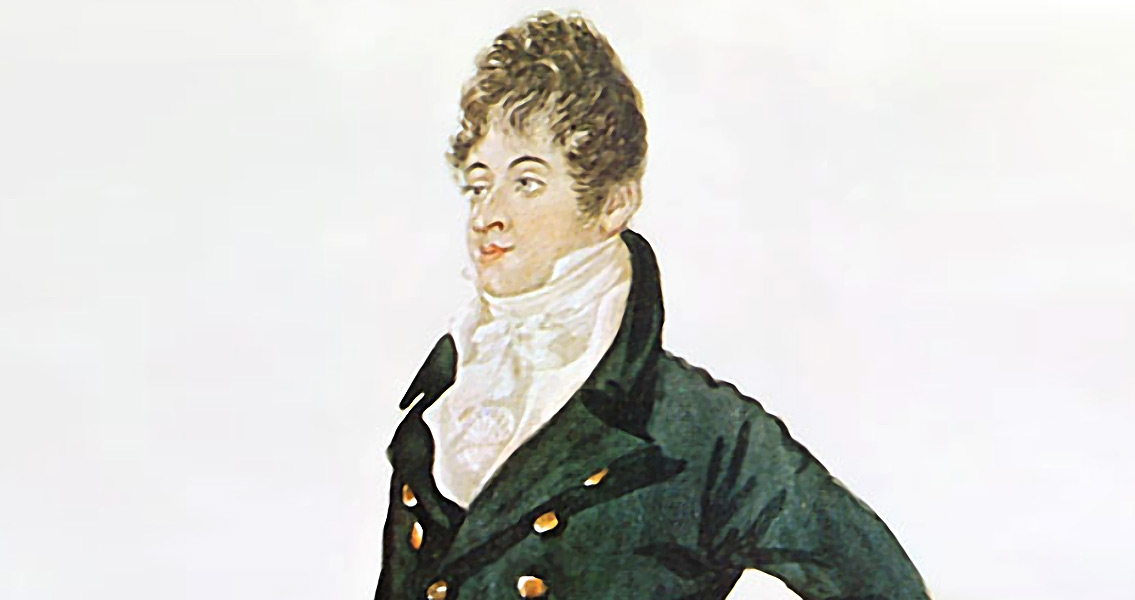<![CDATA[On 30th March, 1840, George Brummell died in an asylum in Caen, France. Popularly known as Beau Brummell, he had once been the darling of London, the archetypal dandy responsible for defining what was fashionable for British high society. His reputation had diminished greatly in the final years of his life however, and his death went almost unnoticed in his home country. Beau Brummell's significance in early nineteenth century British culture is all the more remarkable considering his middle class upbringing and family background, his father was private secretary of Lord North, while his grandfather had been a shop keeper. At the height of Brummell's influence he moved in aristocratic circles and even socialised with royalty at a time when social mobility was severely restricted. He served as a blueprint for celebrity culture and the importance of networking, using style and wit as a basis for his elevated status. Born in 1778, Beau Brummell was educated at Eton, the legendary boarding school renowned for educating future kings and politicians. Despite Brummell being accepted to the school as a fee paying student, which could have led to him being isolated from the more privileged in society, his wit and sharp dress sense made him popular with the aristocracy. It also started his acquaintance with George, Prince of Wales; the future King George VI. This was a relationship which would go on to play a significant role throughout Brummell's life. At sixteen, Brummell earnt a commission in the army and became coronet of the 10th Light Dragoons, popularly referred to as the Hussars. The Hussars were the regiment of the Prince of Wales, giving Brummell the opportunity to develop a friendship with the future King. For four years he served in the regiment, and a series of promotions through the ranks saw him become increasingly prominent in the King's circle of friends. In 1798, when the Hussars were relocated to Manchester, Brummell retired his commission in order to stay in London. This period coincided with Brummell coming into the inheritance from his father's estate, a sum which would be the equivalent to millions of pounds when adjusted to inflation and modern salaries. Brummell's new found wealth gave him the means to forge the identity and lifestyle for which he is now most commonly associated with, starting with him taking up residence in Mayfair, London, in 1799. For more than a decade Beau Brummell dictated fashion in London society, his influence greatly increased by friendship with the Prince. Brummell's distinctive, refined dress sense was imitated throughout society, and his custom had the potential to decide the success of the city's tailors. Similarly, his patronage of a restaurant or club would dramatically increase that establishment's popularity. His wit and reputation also made him a prize guest at any social event or function, his very presence a measure of the occasion's success. Essentially, Beau Brummell's existence was based on style over substance, and this ultimately made his position unsustainable. His inheritance gradually dwindled, and he failed to develop a means to support his extravagant life style. At some point around 1812 his legendary wit failed him and he offended the Prince to the extent that their friendship deteriorated rapidly. Gambling debts worsened Brummell's financial situation, and his reputation declined. In 1816 he fled to France, initially finding employment as the British consul in Caen, appointed by his old friend, King George IV. The salary stabilised Brummell's financial situation initially, but he continued to accumulate debt while in France. In 1832, the consul position was abolished and Brummell once again found himself mired in debt. To make the situation worse, his landlord Madame de St Ursain discovered Brummell had been writing love letters to her teenage daughter, and swiftly evicted him. Impoverished, and possibly suffering from Syphilis, the last years of Brummell's life were completely detached from the glamour of his time at the centre of London society. He spent several months in jail in 1835, and was ultimately admitted to Le Bon Sauveur Asylum in 1839. Brummell's life is remembered for his ability to achieve fame and temporary success purely on the basis of fashion and self-image. He was not the first to achieve this feat, and there have of course been countless others since, but the extent of his influence on British culture was remarkable. In the short term he was swiftly forgotten, an unfortunate result of the temporary memory of fashion he himself had been so pivotal in defining. In the long term however, he is an important case in the history of celebrity culture. As an article in Blackwood's Edinburgh Magazine noted in 1844: "Brummell saw nothing great but his tailor — nothing worthy of respect among the human arts but the art of cutting out a coat — and nothing fit to ensure human fame with posterity but the power to create and to bequeath a new fashion."]]>
Beau Brummell Dies in A French Asylum
